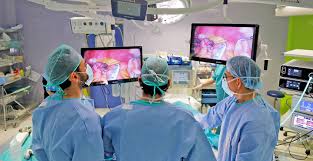Are you struggling with obesity and finding it difficult to lose weight despite numerous attempts? Metabolic and bariatric surgery might be the solution you've been searching for. In this article, we will delve into the world of metabolic and bariatric surgery, discussing who should consider this life-changing procedure. Whether you have tried countless diets, exercise regimens, or other weight loss methods, read on to discover if metabolic and bariatric surgery in Dubai is the right path for you.
What is Metabolic and Bariatric Surgery?
Metabolic and bariatric surgery, also known as weight loss surgery, is a surgical procedure designed to aid individuals with significant weight loss in Dubai. It involves making changes to the digestive system to restrict food intake, reduce the absorption of nutrients, or both. This surgical intervention can provide remarkable results for individuals who have struggled with obesity and failed to achieve sustainable weight loss through traditional methods.
Understanding the Procedure
During metabolic and bariatric surgery in Dubai, the surgeon modifies the stomach and sometimes the small intestine to alter the way food is digested and absorbed. These modifications can be achieved through various techniques, such as gastric bypass, gastric sleeve, gastric banding, or biliopancreatic diversion with a duodenal switch. Each technique has its own unique mechanism of action, but they all aim to limit food intake or reduce the body's ability to absorb nutrients.
How it Works: Restrictive and Malabsorptive Mechanisms
The primary mechanisms behind metabolic and bariatric surgery are restriction and malabsorption. Restrictive procedures involve reducing the size of the stomach, creating a smaller pouch that can hold less food. This leads to a feeling of fullness with smaller portions, thus promoting weight loss.
Malabsorptive procedures, on the other hand, focus on bypassing a portion of the small intestine, reducing the amount of surface area available for nutrient absorption. This results in fewer calories and nutrients being absorbed by the body, leading to additional weight loss.
By combining both restrictive and malabsorptive elements, certain surgical techniques provide a comprehensive approach to weight loss and can yield significant long-term results.
Benefits of Metabolic and Bariatric Surgery
Metabolic and bariatric surgery offers numerous benefits that extend beyond just weight loss. Let's explore some of the key advantages individuals can experience:
Significant Weight Loss
One of the most evident benefits of metabolic and bariatric surgery is the potential for significant weight loss. Studies have shown that patients can achieve substantial reductions in excess weight within the first year after surgery. This weight loss can positively impact overall health and reduce the risk of obesity-related conditions.
Improvement in Obesity-Related Conditions
Metabolic and bariatric surgery can lead to improvements or even remission of obesity-related health conditions. Conditions such as type 2 diabetes, high blood pressure, sleep apnea, and joint pain have shown remarkable improvement after weight loss surgery. This improvement often leads to a reduction or complete elimination of medication previously required to manage these conditions.
Enhanced Quality of Life
Obesity can take a toll on an individual's quality of life, affecting physical, emotional, and social well-being. Metabolic and bariatric surgery offers an opportunity for individuals to regain control over their lives. By achieving substantial weight loss, individuals often experience increased energy levels, improved mobility, enhanced self-esteem, and a renewed sense of confidence.
Eligibility Criteria for Metabolic and Bariatric Surgery
While metabolic and bariatric surgery can be life-changing, not everyone is a suitable candidate for the procedure. Eligibility criteria are put in place to ensure the safety and success of the surgery. The following factors are considered when determining if an individual should consider metabolic and bariatric surgery:
Body Mass Index (BMI) and Weight Considerations
BMI is a measure of body fat based on an individual's weight and height. Generally, individuals with a BMI of 40 or higher, or a BMI of 35-39.9 with obesity-related health conditions, may be eligible for metabolic and bariatric surgery. However, these criteria can vary depending on the specific surgical technique and individual circumstances.
Obesity-Related Health Conditions
Individuals with obesity-related health conditions, such as type 2 diabetes, hypertension, or sleep apnea, may be considered for metabolic and bariatric surgery, even with a lower BMI. These conditions often improve significantly or go into remission following weight loss surgery.
Previous Weight Loss Attempts
Metabolic and bariatric surgery is typically recommended for individuals who have made previous attempts to lose weight through non-surgical methods but have been unsuccessful in achieving and maintaining significant weight loss. Surgery is often seen as a viable option when other approaches have been exhausted or proven ineffective.
It's important to note that eligibility criteria may vary depending on the surgical procedure and the guidelines set by healthcare professionals. A thorough evaluation by a qualified healthcare team is necessary to determine an individual's eligibility for metabolic and bariatric surgery.
Preparing for Metabolic and Bariatric Surgery
Preparation is a crucial step on the journey to metabolic and bariatric surgery. Prior to the procedure, individuals will undergo several assessments and make lifestyle changes to ensure a successful outcome. Here are some important aspects of pre-surgery preparation:
Medical Evaluation and Screening
Before proceeding with metabolic and bariatric surgery, a comprehensive medical evaluation will be conducted. This evaluation may include physical examinations, blood tests, imaging studies, and consultations with various specialists. These assessments help identify any potential risks or underlying medical conditions that need to be addressed before surgery.
Lifestyle Changes and Counseling
Metabolic and bariatric surgery requires individuals to make significant lifestyle changes to support their weight loss journey. This may involve adopting a healthy and balanced diet, incorporating regular exercise, and addressing any underlying psychological or emotional factors related to food and eating behaviors. Counseling and support from healthcare professionals, dietitians, and psychologists play a crucial role in preparing individuals for the changes ahead.
Support Network
Building a strong support network is essential throughout the entire process of metabolic and bariatric surgery. Support can come from family, friends, support groups, or online communities. Having individuals who understand and empathize with the challenges and triumphs of the weight loss journey can provide encouragement and motivation along the way.
Conclusion
Metabolic and bariatric surgery offers hope and a transformative solution for individuals struggling with obesity and its associated health conditions. Throughout this article, we have explored the world of metabolic and bariatric surgery, discussing who should consider this life-changing procedure.
We learned that metabolic and bariatric surgery involves surgical modifications to the digestive system, aiming to restrict food intake, reduce nutrient absorption, or both. This procedure provides significant weight loss, improves obesity-related conditions, and enhances the overall quality of life.
However, it is important to note that metabolic and bariatric surgery is not a quick fix or a one-size-fits-all solution. Eligibility criteria, including body mass index (BMI), obesity-related health conditions, and previous weight loss attempts, help determine who is a suitable candidate for the surgery.






